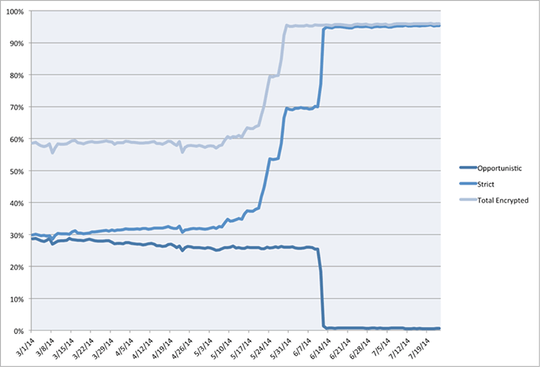SMTP STARTTLS is transport encryption. That is, it encrypts the connection between two mail servers as they relay mail. It does not encrypt the mail stored on the servers.
Basically, email travels across the Internet similar to this:
Your mail client ---SMTP--> your ISP's mail server
your ISP's mail server ---SMTP---> recipient's ISP's mail server
recipient's ISP's mail server ---POP3/IMAP---> recipient's mail client
Your ISP may actually have a few mail servers the email traverses, so too might the recipient's. And of course if one of the mail clients involved is webmail (e.g., GMail), then there may well be other protocols involved.
The least-secure part of this is when the mail is being sent between your ISP's server and the recipient's ISP's server. That was, traditionally, a completely un-encrypted connection across the Internet. The graph in your question is about securing that connection.
Its very similar to when you access a secure web page; the un-encrypted (cleartext) version exists on your computer and the web server, it's just encrypted for its travel across the Internet. Similarly, the cleartext version of the email exists on all the mail servers, its just encrypted to travel across the Internet.
Spam filtering has always been done on the cleartext version, and STARTTLS does not change that.
Encryption with GnuPG or S/MIME, on the other hand, encrypt the message before it leaves your machine. Then none of the mail servers have access to the cleartext, and hence that would impact spam filtering. Note that while STARTLS encrypts the entire SMTP session (including the sender and recipient addresses), GnuPG and S/MIME do not; they need to be in cleartext, otherwise the mail servers wouldn't know where to send the mail.

Nothing Unix/Linux specific about this. security.SE would be more appropriate. – sch – 2014-08-22T10:38:40.277